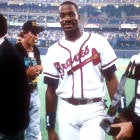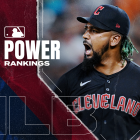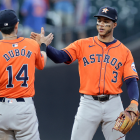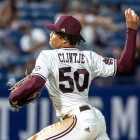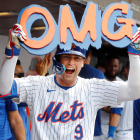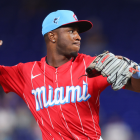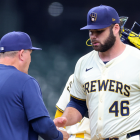Fred McGriff is on his 10th and final Hall of Fame ballot this year. He's not going to make it. He dipped to 11.7 percent of the vote in 2014 and has risen to 23.2 percent. Even though he's gained a lot of votes for his final year bump, he's still not even tracking 40 percent (via Ryan Thibodaux's excellent work). This is it. It's McGriff's swan song on the Hall of Fame ballot and I can't help but think he's been wronged here for numerous reasons that were outside his control.
Revisionist history
Many people talk about this gut feel of a player. We'll hear about how "feared" Jim Rice was and that was part of the reason he made the Hall of Fame. Some like to say something like "you just know" a Hall of Famer instead of having to be talked into it. Some like to talk about how a Hall of Famer has to be "the most dominant" at his position or even in the league for a time period, which is ignorant to what the Hall of Fame is, but it's still being said.
Some of these people will say that McGriff was never a feared hitter who was dominant and he never felt like a Hall of Famer.
This is ridiculous. Anyone who was a die-hard baseball fan in the late 80's and early 90's (raises hand!) knows how big a deal McGriff was.
McGriff was the single best power hitter in baseball for a decent stretch. He was feared. He was a dominant power force for playoff teams. Here's the statistical proof. From 1988-94 -- seven years! -- here are the players who hit at least 200 home runs:
- McGriff, 242
- Barry Bonds, 218
- Joe Carter, 213
- Jose Canseco, 207
That's a big gap, no? For seven years, McGriff was head and shoulders above everyone else at the best possible thing a hitter could do. In that span, he hit .288/.390/.545 (155 OPS+). Get outta here with the "he wasn't dominant" nonsense.
For seven years, Fred McGriff was the gold standard power hitter in Major League Baseball.
The PED era
Right after that, however, came the era where leading the league with 35 home runs (as McGriff did in 1992) or 36 (McGriff in 1989) would be utterly laughable. It was the latter part of McGriff's career when we saw players posting 60-plus-homer seasons and fly past 500 career homers. We just kind of collectively became numb to a player who never topped 40 homers but did hit at least 30 in 10 seasons. McGriff drove home more than 100 runs eight times and topped 90 RBI another four times, yet never drove home 110.
For the people staring at the gaudy home run and RBI totals from 1997ish through the middle of the next decade, McGriff's number just no longer popped.
We've gotta keep in mind that different eras have different numbers. McGriff from 1988-94 was 55 percent better than the average hitter in terms of getting on base and hitting for power, but he "only" averaged 35 homers per year as the best power hitter in baseball.
Let's not forget the proper perspective on McGriff like so many voters over the years have.
The 1994-95 strike
Of course, McGriff was probably in the midst of his signature season when the 1994 strike happened. He was hitting .318/.389/.623 with 34 homers and 94 RBI at the time, though 114 games for the Braves. Those are 162-game paces of 48 homers and 134 RBI. Even if he leveled off some in the latter part of August and then September, he was surely going to end up with at least 40 homers and more than 115 RBI. It's possible those numbers would have popped more for Hall of Fame voters.
Not just those numbers, of course. Keep in mind, the strike bled into 1995 and they only played 144 games that year. McGriff played in every single one of them, hitting 27 homers and driving home 93 runs. I think we can safely assume he was gonna add another 30-homer, 100-RBI season if that was a full year.
Also, the career numbers and one in particular really stand out here. McGriff finished with 493 career home runs. You can't possibly tell me the 66 games lost to the strike cost McGriff fewer than seven home runs.
Let's say the strike never happened and McGriff posted something like 45 homers and 125 RBI in 1994 while he topped 30 and 100 in 1995, giving him more than 500 home runs in his career, one everyone presumes was clean of PEDs.
I just can't see how McGriff wouldn't have been already enshrined.
Instead, here is McGriff's final Hall of Fame resume:
A slash line of .284/.377/.509 with a 134 OPS+, 2,490 hits (again, the strike cost him from getting to the 2,500 milestone), 441 doubles, 493 home runs, 1,550 RBI, 1,349 runs, a .303/.385/.532 postseason line with 10 homers and 37 RBI in 50 games, a World Series ring, two pennants, five All-Star games, three Silver Sluggers, seven top-10 finishes in MVP voting and, as noted above, being the most feared power hitter in baseball for seven years. He had 10 30-homer seasons (only 14 players have more) and eight 100-RBI seasons.
JAWS isn't on his side -- he's 31st among first baseman and well below the average threshold -- but I just can't shake that McGriff has been fighting an unfair battle here after the strike, the PED era and revisionist history have conspired against him. I don't yet have a vote -- seven more years! -- and my "this would be my ballot" article is forthcoming, but I'll give a spoiler: He was my 10th and final pick. He deserved better in his process.









